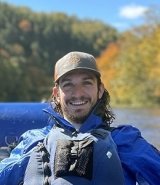Quest Outdoor Adventure and Leadership
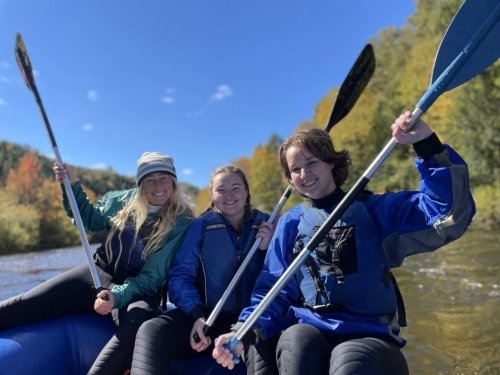
- Contact Information
-
- Bloomsburg
-
Nick McCormack
Director - Quest
570-336-3693
nmccormack@commonwealthu.edu
Quest Office Upper Campus
- Social Media
Quest is an outdoor adventure and leadership program, sporting a fun-focused community of student workers and professionals working in tandem to improve student wellness while providing unique and accessible experiences in the outdoors.
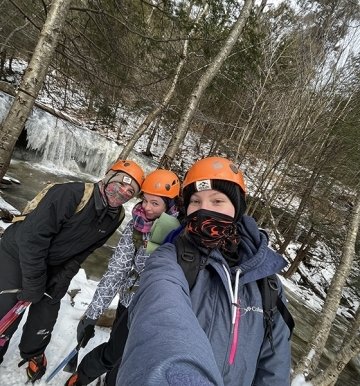
Quest offers truly unique and exciting outdoor and educational experiences through adventure programming and team development open to all, including those who've never set foot in the backcountry to experienced and knowledgeable campaigners.
Discover a new version of yourself or reach a personal new level with Quest's multitude of adventures at your fingertips!
Kayak down the Susquehanna. Hike through Worlds End. Climb the cliffs of Mocanaqua. Dive deep in Henigh Cave. Or, simply enjoy the chill vibes of a bonfire on upper campus. It starts here ... with Quest. Let's go!
Quest Information
Quest is opening up its 70ft climbing tower and both its ziplines on April 12th!
Event Date: April 12th
Event Time: 1pm-5pm
Location: Upper Campus at Bloomsburg University
$10 unlimited climbing and Riding
Cash or card accepted! Pay at the door.
Check out our brand new 70ft climbing tower! Zip through the woods!
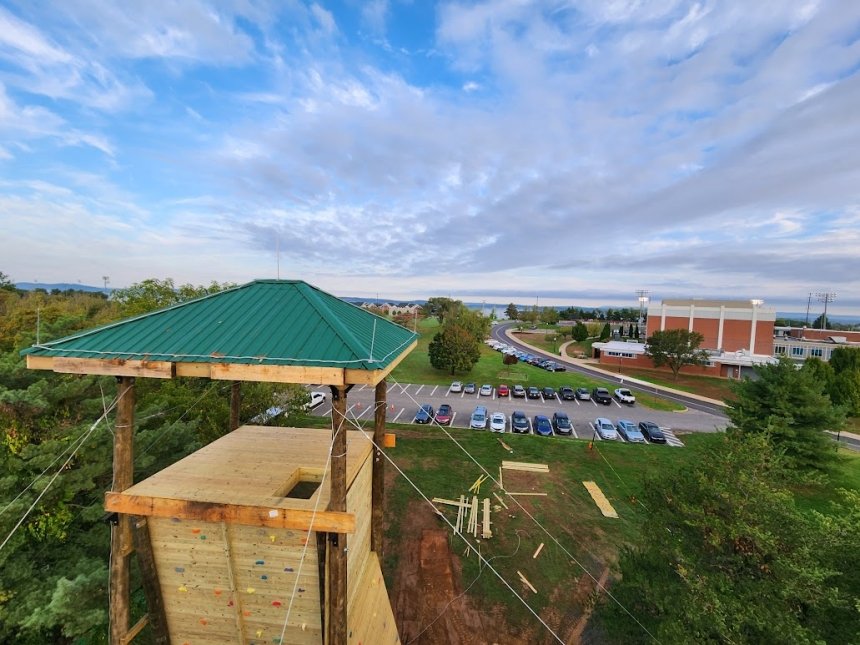
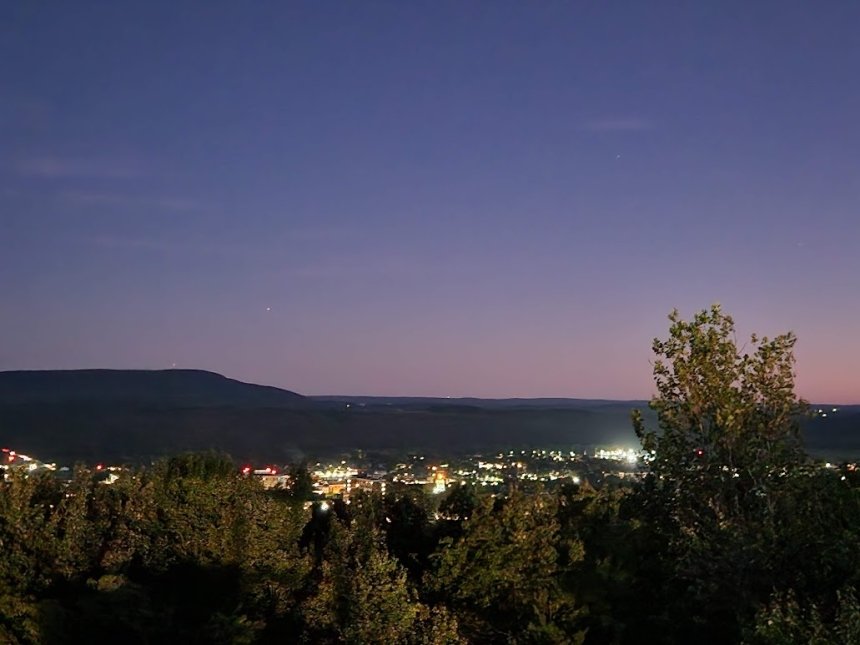
Calling all women! Are you ready to get outside?
We have a program for you!
The Women’s Adventure Program has been created by women, for women!
We are looking for 5-10 women who are interested in taking a step out of their comfort zone and developing leadership skills through adventure!
WAE will take place in the fall 2025 semester and will consist of:
5 weekend adventure trips
3 evening community building sessions
A small group of like-minded women all looking to get outdoors
A whole lot of fun!
The WAE schedule will be:
Sunday, August 31: White Water Rafting
Sunday, September 14: Kayaking
Friday-Saturday September 26-27: Camping and Hiking
Sunday October 5: Climbing
Sunday October 19: High Ropes Course/ Rock Wall
*Evening sessions TBA after sign ups close
Why you should join WAE:
Exclusive adventure trips with gear, guides, and transportation all included
Evening sessions for crafting, collaborating and connecting
Safe and supportive experiences in the outdoors and on adventure trips
Opportunities to learn skills and expertise needed to lead outdoor trips
Leadership skill development
Personal goal development
New friends!
How to join:
WAE will cost $250 per person
This price covers the cost needed to run exclusive programs with experience guides and all of the gear and transportation included as well as provide fun and informational evening sessions to hang out, play games and create personalized journals which will be covered by WAE
Spots are limited! You can only reserve a spot by registering
To sign up: use this link and register by the end of May 2025.
Once sign ups are closed, the guides will reach out by email with more information so you are prepared to start in the Fall semester.
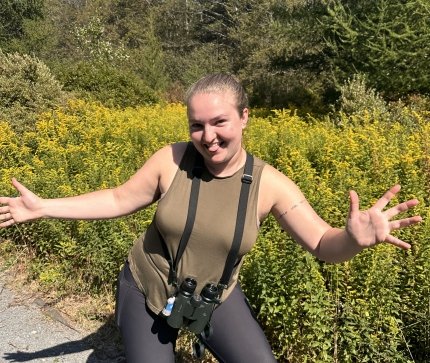
Meet your guides:
Hi! My name is Liz and I have been a part of QUEST since 2019. I am a grad student at CU and I love hiking and kayaking. I can’t wait to meet you and adventure together!! You can reach me at EJL49275@commonwealthu.edu
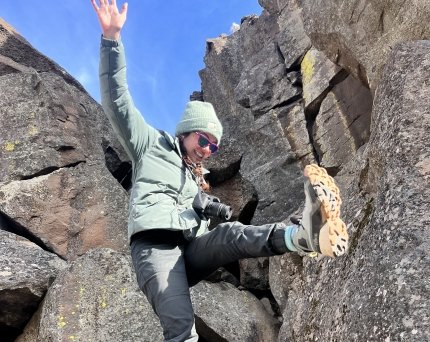
Hello! My name is Lily, and I’ll be a senior this fall. I’ve been with QUEST since my freshman year, and it was the best decision I have made. I love climbing and hiking, and I can’t wait to meet everyone! You can reach me at lmk15186@commonwealthu.edu
If you have any questions, feel free to email us to chat and get more info! We would love to have you in our program!!!
Quest offers a variety of adventure programs each semester for CU-Bloomsburg students and Community members. These trips range from whitewater rafting to hiking to sunset kayaking to caving. These adventures are also open to the public for an additional cost.
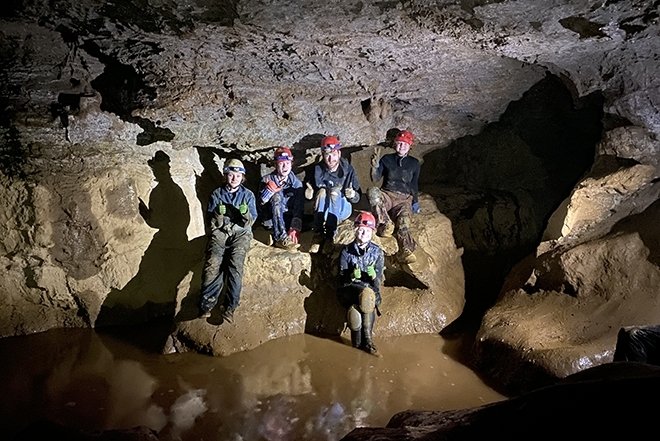
The most active, outdoor, and adventure-oriented summer camps in the region! A week filled with rafting, kayaking, hiking, rock wall climbing, high ropes, low ropes, zip lines, as well as field games, and crafts!
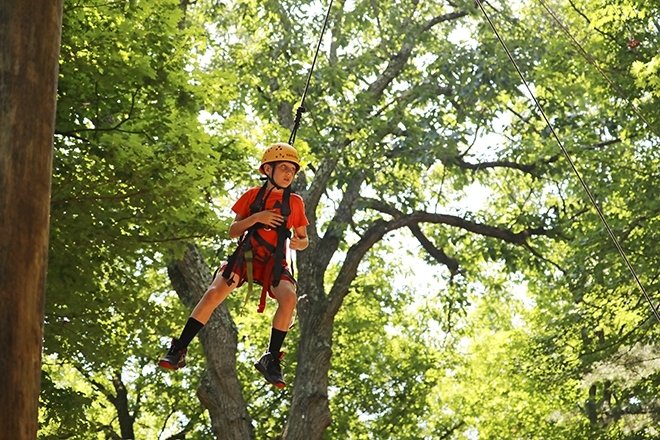
In addition to adventure programs, Quest offers team development programming across Commonwealth University and to external organizations and groups.
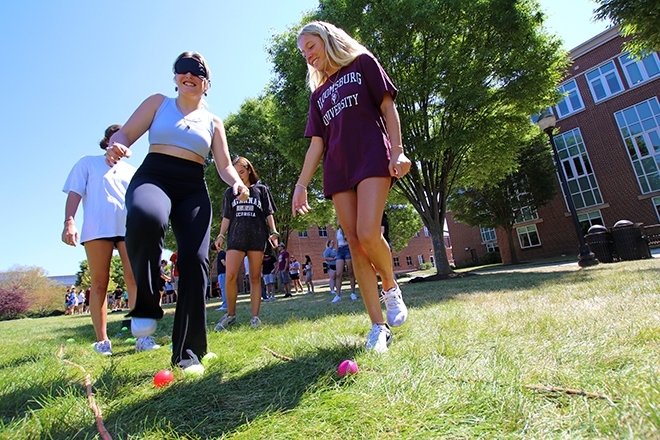
Quest provides Wilderness First Aid training and Wilderness First Responder courses through NOLS, a nonprofit global wilderness school that seeks to help you step forward boldly as a leader.
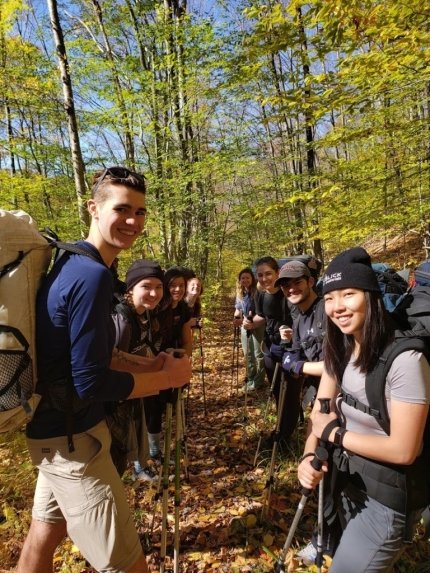
Bloom Boulder Bash is a bouldering competition at Commonwealth University-Bloomsburg, held on a 39-foot Entre‐Prizes imprint climbing wall and freeform boulder area inside the Student Recreation Center.
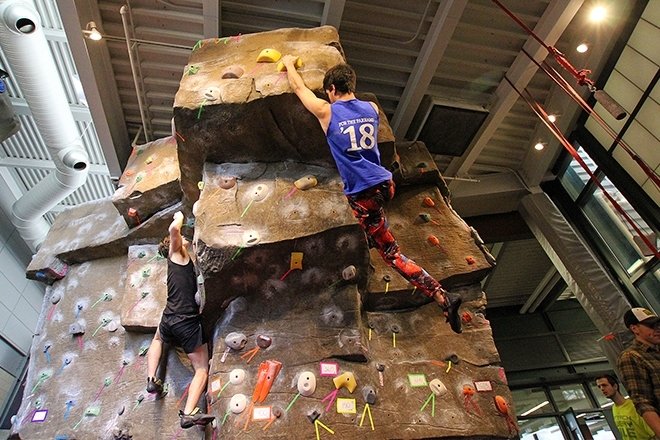
Join our Team
Contact the Quest director to inquire about these positions!
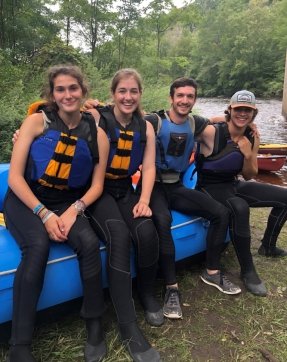
Take a leading role around campus and learn fun and engaging skills that allow you to lead your peers into the backcountry on adventures of a lifetime. Join a warm community of people who love to enjoy the outdoors, a community full of fun and exciting adventures and friendships that will last a lifetime. Grow as a leader when guiding groups through our adventure programming and unlock the leading potential inside yourself.
Take advantage of the best job on campus, get paid to take people hiking, kayaking, rafting and so much more!
Working for Quest allows you the flexibility of a work study job without having to give up your current work study job on campus, if you have one, because Quest payroll isn't part of the work study program so you can be paid both by your work study and Quest at the same time!

Working for the Quest Summer Camps is a truly rewarding experience.
Spend your Summer days outside and experience the joys of taking kids out into nature, on the water and in our high ropes courses! Grow as a leader, learn to work with kids and have fun doing it, this is an opportunity you don't want to miss!
We are looking for those excited to work with kids and willing to give them the best Summer camp experience we can offer. No experience with high ropes or in the backcountry is necessary as we will have ample opportunity to teach you the skills you need before the camps start. Must be 18 or older to apply.
In order to apply for the position of Quest Summer Camp Counselor follow the steps below:
- Complete the Summer Camp application and email it to nmccormack@commonwealthu.edu.
- Set up an interview with the Quest Director by emailing nmccormack@commonwealthu.edu
- It is your responsibility to reach out to the Director to schedule
- If you are hired you will need to complete the required clearances.
As a student social media coordinator, you will be responsible for developing and implementing Quest's Social Media strategy in order to increase our its presence and overall marketing efforts.
More information about this opportunity coming soon.
- Observer — An observer's role is to attend trips to observe and learn from the leadership techniques used by the current Instructors and Assistant Instructors. They are to learn as much as possible to further their experience towards becoming an AI
- Assistant Instructor — An assistant Instructor is an intermediate step between Observer and Instructor. They will aid Instructors in leading and teaching on trips but will not be responsible for participants without an Instructor or higher present. They will focus on the intricacies of leading people and the technical skills needed to lead in the outdoors.
- Instructor — An Instructor’s role is to teach others, including participants and new staff, skills needed to function and lead in the backcountry. They are leaders in the outdoors and within Quest and so will be planning and executing Quest’s regularly scheduled Outdoor Adventure Programs.
- Course Coordinator — This is the final step after Instructor. A Course Coordinator assumes total responsibility for every aspect of any course with regards to the office, paperwork, emergency situations, and logistics. Once this level is achieved, they will make all final decisions on course. Course coordinators will embody to the fullest the 10 Quest Leadership Principles and perfectly represent Quest, its missions, goals, and policies.
- Summer Camp Counselor
- Summer Camp Manager
- Team Development Facilitator
Quest History
The history of the evolution of Quest is really a history of ideas and the people who had the conviction and energy to bring those ideas to reality.
Vision Statement
- To teach outdoor skills as a means to promote lifelong fitness, personal challenge, and recreation.
- To empower individuals to move beyond self imposed limitations.
- To teach self-reliance, an independent spirit, an unquenchable curiosity, and above all, compassion for all others and all living things.
- To develop team building, leadership, and effective interaction skills.
Leadership Principles
As a leadership development program these are the principles that define what we think is effective leadership. All of our programming is meant to educate on and reinforce these principles. Everyone will have strengths and weaknesses within this list. The goal of the Quest leadership model is to fine tune and expand the strengths and improve the challenge areas specific to each person.
- Be Passionate
- Have a Servant Mentality
- Have a Big Picture Mentality
- Strive for Sound Judgment and Decision Making
- Be willing to question and be questioned
- Inspire Others to Act
- Have Solid Skills and Be Able to Teach Those Skills
- Act as a Facilitator of Knowledge
- Be a Mentor to Others
- Be a Model of Excellence
Based on ideas and principles from Outward Bound, Quest Staff and Kouzes & Posner (2007)
The International Outward Bound Program, with its emphasis on teamwork, leadership and the development of human potential through challenging outdoor activities, attracted the interest of several BU administrators and faculty in the early 1970’s.
John Walker, as Assistant to the President, Steve Breset, Physical Education faculty, and Louis Mingrone, biology faculty, were instrumental in the mid 1970’s in providing that vital initial impetus that led to the establishment of the Quest Program. Together they attended the Association for Experiential Education Conference where other like minded professionals gathered to discuss the educational opportunities afforded by experiential education. The educational rational and philosophical underpinning of experiential education was embraced by this team. All they had to do now was persuade the college elders, Provost, deans and faculty chairpersons. Undoubtedly, without the continuing support of John Walker – who was able to convince President McCormick of the value of this new idea – the early efforts would most likely have foundered. It was John who came up with the name, Quest. He explained, It seemed to capture those value forming experiences that are beneficial to a student’s life at the University.
Steve Breset headed the program and steered it through 1981 when a full-time director was appointed and the program was given a permanent home in Student Life. The next important character to emerge on the scene of this fledging program was Bill Proudman who took over the reins in 1981 after Steve Breset. He was instrumental in forging a program curriculum that exemplified all the early aspirations of its founders. Bill was the right person at the right time a fortuitous event that allowed the program to grow and have an impact on the University community. Bill and students, presumably without the knowledge of some higher authorities, built office space out of what had formerly been the locker room for the University’s football team on the ground floor of Walter Simon Hall. Bill’s surreptitious creation of the office space is an example and a major point in Secretary Colin Powell’s list of leadership skills of what it sometimes takes to take on a traditional institution and create change; get it done and ask permission later.
Backing up a bit. In 1967 a small liberal arts college (Prescott College) in Arizona integrated the concepts of Outward Bound into an innovative program that replaced the traditional physical education program. The focus of the program was to develop leadership, self reliance and teamwork skills. The program, the first of its kind in the nation, received national attention from Time Magazine, CBS, NBC and ABC, and garnered the support of Dewitt Wallace, owner and founder of Readers Digest, who gave the college a large grant to further develop the program. (The founder of this program, Roy Smith, later became director of the Quest Program). This publicity attracted the attention of colleges and universities from around the country who were in interested in starting a similar program. Bloomsburg University, along with Princeton and Cornell, was one of those schools. In 1973, Roy Smith received a letter from John Walker asking if him if he would share his experiences in running the Prescott program. What is interesting about this historical morsel is that 15 years later, in 1988, Roy Smith, left Colorado and assumed directorship of the Quest Program.
By the time Roy arrived in Bloomsburg, his predecessors, the director and associate director had both moved on to other jobs and it was given to Signe Klinger – who had first participated in a Quest course two years earlier to hand over the keys and acquaint Roy with the program, its history, and the areas around Bloomsburg where courses were conducted. Signe was an invaluable link in a broken chain and was immediately promoted to Associate Director, a position she held until the birth of her first child in 1991.
In 1989, with a $10,000 start up grant from the Bloomsburg University Foundation, Roy Smith created the Corporate Institute as an adjunct to Quest and as a major revenue generating source that became the principal underlying financial support for the Quest Program. This revenue source allowed the Quest Program to improve its equipment inventory, expand its student leadership training capabilities and undertake more ambitious international experiences. The housing of the Quest Program and the Corporate Institute under one roof was a mutually beneficial undertaking. It allowed the Corporate Institute to have immediate access to a wide range of training facilities, and for the Quest program to benefit from increased revenue and a ready access to leadership and team development ideas taking place in the corporate world
The Quest program today has grown considerably in size and in the range of courses, and extended trips abroad, that we now offer not only to students at Bloomsburg University but to an extensive list of clientele from other colleges in the region, and community organizations from around the State. Much of this growth can be attributed to the outstanding work of the associate directors, who over the years, have done sterling work in training staff and coordinating a schedule of contract courses.
- 2021 - Present
Nick McCormack - 2015 - 2021
Brianne Oehmke - 2009 - 2015
Brett Simpson - 1988 - 2009
Roy Smith - 1987 - 1988
Chuck Connelly - 1981 - 1987
William Proudman - 1973 - 1981
Stephen Breset
- 2001 - 2009
Brett Simpson - 1997 - 2001
Tony Draus - 1996 - 1997
Mark Wasakoski - 1992 - 1996
Tom Burkiewicz - 1991 - 1992
Karen Michaelson - 1989 - 1991
Signe Klinger - 1987 - 1998
Barbara Lake - 1986 - 1987
Heidi Hammel

